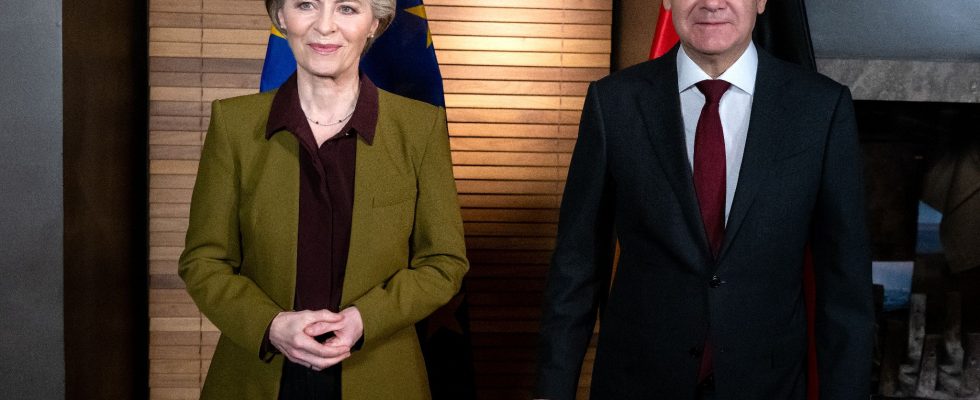Italian reluctance was overcome. The ambassadors of EU countries, meeting on Wednesday October 4 in Brussels, agreed on a key text for the reform of European migration policy, before a summit of the Twenty-Seven on Friday in Spain. An agreement welcomed by German Chancellor Olaf Scholz, which evokes a “historical turning point”.
The regulation under discussion is intended to organize a European response in the event of a massive influx of migrants into an EU country, such as during the refugee crisis of 2015-2016. In particular, it makes it possible to extend the duration of detention of migrants at the bloc’s external borders.
The agreement, announced by the Spanish presidency of the EU, will now have to be the subject of negotiations with the European Parliament. This text, the last piece of the EU’s “Asylum and Migration Pact” on which member states had to agree, encountered objections from Germany for several months, for humanitarian reasons. A compromise was worked out during a meeting of Interior Ministers at the end of September to obtain the green light from Berlin, but Italy then expressed its disagreement.
His objections focused on the role of NGOs rescuing migrants, according to diplomatic sources, with Rome accusing Berlin of financing several relief NGOs in the Mediterranean, some of which operate under the German flag. The head of the Italian government Giorgia Meloni demanded last week that these NGOs disembark migrants in the countries whose flag their boats fly. The compromise adopted on Wednesday finally received the support of both Italy and Germany.
“It is a very positive result, a success for Italy. When Europe decides, it must take into account everyone’s opinion,” responded Italian Foreign Minister Antonio Tajani. The agreement on this text constitutes a “historic turning point which will effectively limit irregular migration in Europe and provide lasting relief to states like Germany”, commented German Chancellor Olaf Scholz.
The European Commission and Spain, which holds the six-monthly presidency of the Council of the EU, had expressed confidence in the prospects of an agreement before the informal European Council which is being held on Friday in Granada (southern Spain). The burning issue of migration will be at the heart of the discussions of heads of state and government.
Pressure from Parliament
The paralysis of this “crisis regulation” aroused frustration within the EU, faced with the increase in migrant arrivals at its external borders and the situation on the Italian island of Lampedusa.
The text provides, in the event of a “massive” and “exceptional” influx of migrants, the establishment of an exceptional regime less protective for asylum seekers than the usual procedures. It extends the possible duration of detention of a migrant at the external borders of the EU, up to 40 weeks, and allows faster and simplified asylum application examination procedures for a larger number of exiles ( all those coming from countries whose recognition rate, that is to say the rate of positive response to asylum requests, is less than 75%), in order to be able to send them back more easily.
It also provides for a rapid triggering of solidarity mechanisms towards the Member State faced with this influx, in particular in the form of relocation of asylum seekers or a financial contribution.
At a meeting in July, the majority necessary for the adoption of this regulation was not reached. Germany notably abstained due to opposition from the Greens, members of the ruling coalition, who demanded accommodation for minors and families. To push the Twenty-Seven to agree on this regulation, the European Parliament has decided to pause the negotiations already started with the Member States on two other texts of the migration package, aimed at strengthening security at the external borders.
But the agreement reached on Wednesday “is a big step forward, and we are now in a better position to reach an agreement on the whole Asylum and Migration Pact with Parliament by the end of this semester”, he said. assured the Spanish Minister of the Interior Fernando Grande-Marlaska Gomez. The stated objective is in any case to achieve adoption of this Pact, presented in September 2020 by the European Commission and including around ten pieces of legislation, before the European elections in June 2024.
During the vote on Wednesday, Austria, Slovakia and the Czech Republic abstained on Wednesday while Poland and Hungary opposed it, according to a diplomatic source. “We call on Brussels to immediately put an end to this migration policy, to compulsory resettlement quotas (…) The growing migratory pressure on Central Europe is entirely attributable to Brussels” which “supports the economic model of smugglers”, reacted Hungarian Foreign Minister Peter Szijjarto.
